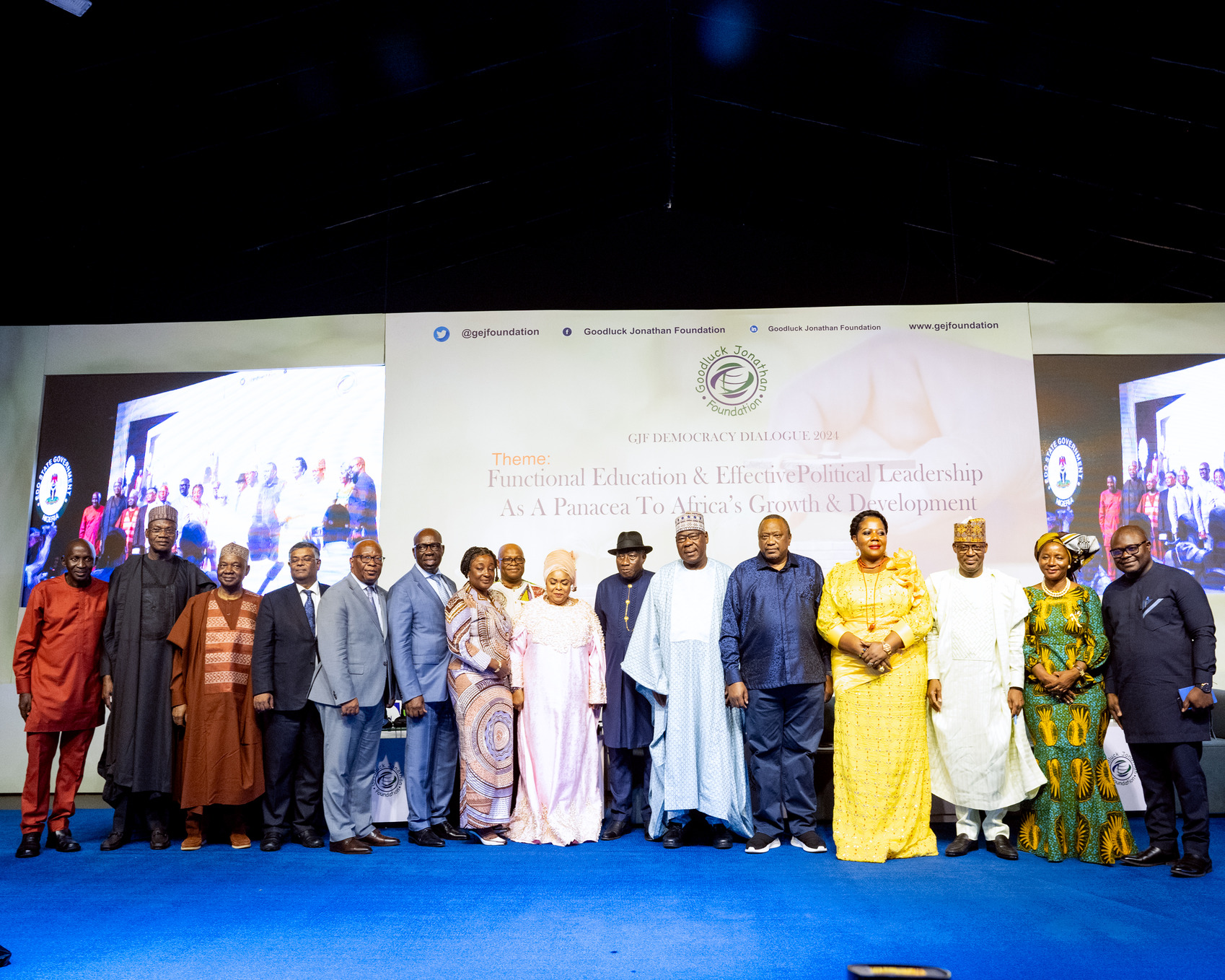GJF 2024 Democracy Dialogue ends with, calls on African leaders to prioritize education towards societal transformation

14 June, 2024
This year’s Goodluck Jonathan Foundation (GJF) Democracy Dialogue held in Benin, Edo State, with stakeholders calling on African leaders to prioritize functional education and effective leadership toward achieving growth and development for the African continent.
Participants at the dialogue comprised foremost African leaders, academics, development experts, politicians, civil society groups, traditional rulers and students spoke on the need for African leaders to develop innovative educational policies that will help guarantee growth and sustainable development.
In statement signed and issued to newsmen, Yenagoa the Bayelsa by Wealth Dickson Ominabo.
Communications Officer Goodluck Jonathan Foundation
Some of the dignitaries at the event were the former President of Kenya, Uhuru Kenyatta, former president of Niger, Thomas Boni Yayi, former president of Nigeria and Chairman of Goodluck Jonathan Foundation, Dr Goodluck Ebele Jonathan, former Vice President of Zambia, Dr Mumba Nevers Sekwila.
Former vice president of Nigeria, Arch Namadi Sambo, governor of Edo State, Godwin Obaseki, former governor of Anambra State, Peter Obi, Indian High Commissioner to Nigeria, Shri Balasubramanian.
Others are Director UNDP Sub-regional Hub for West Africa, Njoya Tikum, Acting Executive Secretary National Universities Commission (NUC), Chris Maiyaki and deputy governors of Bayelsa, Rivers, Delta, Edo, and Bauchi.
Chairman of the occasion and former President of Kenya, Uhuru Kenyatta in his remarks called on African leaders and policymakers to develop strategies and policies that will set the continent on a winning trajectory.
His words: “As African leaders gathered here today, let us take up this task with the seriousness that it deserves to the leaders of tomorrow.
“As a continent, we must look at our curricula in comparison with the changing global needs and embrace an education system that aims to foster critical thinking, innovation and creativity as this will bolster the continent to immeasurable heights.
“It is our task as leaders of this great continent, to empower our youth with the tools that will shape and prepare them to be great and active participants in the global economy.
“We must therefore intentionally invest in education to ensure inclusivity, diversity and equal opportunity for all our children. This will help foster a conducive environment for innovation and growth.
Keynote speaker at the dialogue Prof Olubayi Olubayi in his address called on governments around the continent to rethink their educational policies to foster growth and guarantee inclusivity.
He said : “Each country that wants to succeed must provide education for 80% of its population that is of average ability, but it must also, at the same time, provide education for the other 20% that is exceptionally highly gifted and highly talented.
“This is the better meaning of inclusion. Education for the 80% and education for the 20% in institutions that maintain symbiotic collaborations.
“The open secret is that for a country to have a genuine functional education it must have a two-sided strategy that is based on the pareto principle of 80/20.
“Our current school systems will continue to educate the 80% who are the majority.
“If we care for Africa’s future, If we care for our grandchildren, If we care for our dignity as human beings, If we care at all, we must ensure functional education within our home regions and countries.
“If we care at all, we must find a way to ensure that each African nation or state establishes at least ONE highly selective world-class university that will be the primary source and catalyst for effective leadership, innovation, technology, growth and development.
Speaking further he said: we must each return to our villages or towns working or local government areas or counties or districts and start the sacrifice and hard work of mobilizing resources to set up the first highly selective world-class primary or secondary school as a centre of excellence for the free education of the less than 20% of the population of our children that is most gifted and most talented.
Speaking on the importance of the theme of this year’s dialogue, Functional Education and Effective Leadership as a Panacea to Growth and Development, the Executive Director of the Goodluck Jonathan Foundation, Ann Iyonu noted that functional education and effective political leadership are interconnected goals that require concerted efforts from governments, civil society, and the private sector.
She said: “Functional education can empower citizens to actively participate in the political process, hold their leaders accountable, and contribute to the socio-economic development of their countries.
“Conversely, effective political leadership can create an enabling environment for education reform, investment in human capital, and the creation of opportunities for all citizens to thrive.”